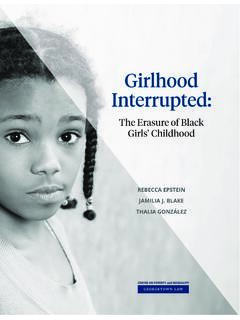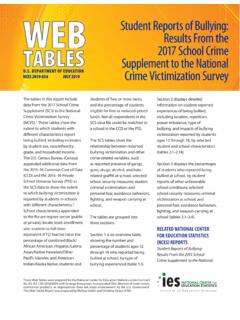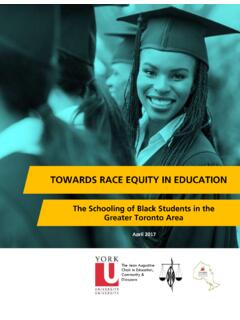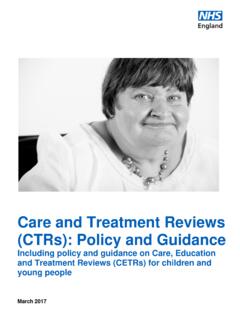Transcription of Exclusion from maintained schools, academies and pupil …
1 Exclusion from maintained schools, academies and pupil referral units in England Statutory guidance for those with legal responsibilities in relation to Exclusion September 2017 2 Contents Summary 3 1. About this guide 5 2. Key points 6 3. The head teacher s power to exclude 8 4. The head teacher s duty to inform parties about an Exclusion 12 5. The governing board s and local authority s duties to arrange education for excluded pupils 16 6. The governing board s duty to consider an Exclusion 18 7. The governing board s duty to remove a permanently excluded pupil s name from the school register 25 8. The local authority s/academy trust s duty to arrange an independent review panel 27 9. The duties of independent review panel members, the clerk and the SEN expert in the conduct of an independent review panel 35 10. The governing board s duty to reconsider reinstatement following a review 41 11. The local authority s role in overseeing the financial readjustment/payment 43 12.
2 Statutory guidance to the head teacher, governing board and independent review panel members on police involvement and parallel criminal proceedings 45 Useful links 46 Annex A A summary of the governing board s duties to review the head teacher s Exclusion decision 47 Annex B A non-statutory guide for head teachers 48 Annex C A guide for parents/carers 56 3 Summary This document from the Department for education provides a guide to the legislation that governs the Exclusion of pupils from maintained schools, pupil referral units (PRUs), academy schools (including free schools, studio schools and university technology colleges) and alternative provision academies (including alternative provision free schools) in England. The guide to the law sections in this guidance should not be used as a substitute for legislation and legal advice. The document also provides statutory guidance to which head teachers, governing boards, local authorities, academy trusts, independent review panel members and special educational needs (SEN) experts must have regard when carrying out their functions in relation to exclusions.
3 Clerks to independent review panels must also be trained to know and understand this guidance. The phrase must have regard , when used in this context, does not mean that the sections of statutory guidance have to be followed in every detail, but that they should be followed unless there is a good reason not to in a particular case. Where relevant, this document refers to other guidance in areas such as behaviour, SEN, and equality, but it is not intended to provide detailed guidance on these issues. This document replaces the version published in 2012 for schools in England. Expiry or review date This guidance will be kept under review and updated as necessary. Who is this publication for? This guidance is for: Head teachers, governing boards, local authorities, academy trusts, independent review panel members, independent review panel clerks, and individuals appointed as SEN experts. The term head teacher in this document includes the teacher in charge at a PRU and principals of academies .
4 The term governing board includes the governing body of a maintained school , the management committee of a PRU and the academy trust of an academy. Except where specifically stated, this guide applies to all maintained schools, academy schools (including free schools but not 16-19 academies ), alternative provision academies (including alternative provision free schools), and PRUs. The term school in this document is used to describe any school to which the 4 guidance applies. Where the term academy is used it refers to any category of academy to which the guidance applies. Except in relation to pupils in PRUs, or where stated, the requirements of the guide apply in relation to all pupils, including those who may be below or above compulsory school age, such as those attending nursery classes or sixth forms. This guide does not apply to independent schools (other than the academies listed above), city technology colleges, city colleges for the technology of the arts, sixth form colleges or 16-19 academies , all of which have separate Exclusion procedures.
5 Local authorities are, however, required to arrange educational provision for pupils of compulsory school age who are excluded from these institutions if they would not otherwise receive such education . Any pupil who was excluded before September 2017 , and whose Exclusion is still subject to review at this point, should be considered on the basis of the September 2012 guidance. 5 1. About this guide What legislation does this guide relate to? The principal legislation to which this guidance relates is: the education Act 2002, as amended by the education Act 2011; the school Discipline ( pupil Exclusions and Reviews) (England) Regulations 2012; the education and Inspections Act 2006; the education Act 1996; and the education (Provision of Full-Time education for Excluded Pupils) (England) Regulations 2007, as amended by the education (Provision of Full-Time education for Excluded Pupils) (England) (Amendment) Regulations 2014. Definition of parents in this guidance The definition of a parent for the purposes of the education Acts is broadly drawn.
6 In addition to the child's birth parents, references to parents in this guidance include any person who has parental responsibility (which includes the local authority where it has a care order in respect of the child) and any person (for example, a foster carer) with whom the child lives. Where practicable, all those with parental responsibility should be involved in the exclusions process. (Further information for parents on Exclusion can be found in Annex C to this guidance entitled a guide for parents/carers). Legislation on Exclusion gives clarity and certainty to schools, local authorities, academy trusts and review panels, in terms of how they discharge their obligations to parents. Obligations are to the relevant person a parent or the pupil , aged 18 or over. Definition of term and academic year in this guidance Where a school s academic year consists of three terms or fewer, a reference to a term in this guidance means one of those terms. Where a school s academic year consists of more than three terms, then a reference to term means the periods from 31 December to Easter Monday, from Easter Monday to 31 July and from 31 July to 31 December.
7 In this guidance academic year means a school s academic year beginning with the first day of school after 31 July and ending with the first day of school after the following 31 July. 6 2. Key points The legislation governing the Exclusion process remains unchanged. This statutory guidance has been updated in a small number of areas, in particular to provide greater confidence to head teachers on their use of Exclusion and to provide greater clarity to independent review panels and governing boards on their consideration of Exclusion decisions. In January 2015, the Department amended regulations to clarify that a governing board s duty to arrange education from the sixth day of a fixed-period Exclusion is triggered by consecutive fixed-period exclusions totalling more than five days1. Good discipline in schools is essential to ensure that all pupils can benefit from the opportunities provided by education . The Government supports head teachers in using Exclusion as a sanction where it is warranted.
8 However, permanent Exclusion should only be used as a last resort, in response to a serious breach or persistent breaches of the school 's behaviour policy; and where allowing the pupil to remain in school would seriously harm the education or welfare of the pupil or others in the school . The decision to exclude a pupil must be lawful, reasonable and fair. Schools have a statutory duty not to discriminate against pupils on the basis of protected characteristics, such as disability or race. Schools should give particular consideration to the fair treatment of pupils from groups who are vulnerable to Exclusion . Disruptive behaviour can be an indication of unmet needs. Where a school has concerns about a pupil s behaviour, it should try to identify whether there are any causal factors and intervene early in order to reduce the need for a subsequent Exclusion . In this situation, schools should consider whether a multi-agency assessment that goes beyond the pupil s educational needs is required.
9 Schools should have a strategy for reintegrating a pupil who returns to school following a fixed-period Exclusion and for managing their future behaviour. All children have a right to education . Schools should take reasonable steps to set and mark work for pupils during the first five school days of an Exclusion ; and alternative provision must be arranged from the sixth day. There are obvious benefits in arranging alternative provision to begin as soon as possible after an Exclusion . Where parents dispute the decision of a governing board not to reinstate a permanently excluded pupil , they can ask for this decision to be reviewed by an independent review panel. Where there is an allegation of discrimination (under the Equality Act 2010) in relation to a fixed-period or permanent Exclusion , parents can also make a claim to the First-tier Tribunal (Special Educational Needs and 1 education (Provision of Full-Time education for Excluded Pupils) (England) (Amendment) Regulations 2014, amending the education (Provision of Full-Time education for Excluded Pupils) (England) Regulations 2007.)
10 7 Disability) for disability discrimination, or the County Court for other forms of discrimination. An independent review panel does not have the power to direct a governing board to reinstate an excluded pupil . However, where a panel decides that a governing board s decision is flawed when considered in the light of the principles applicable on an application for judicial review, it can direct a governing board to reconsider its decision. The panel will then be expected to order that the school must make an additional payment of 4,000 if it does not offer to reinstate the pupil . Whether or not a school recognises a pupil as having SEN, all parents have the right to request the presence of an SEN expert at a review meeting. The SEN expert s role is to advise the review panel, orally or in writing or both, impartially, of the relevance of SEN in the context and circumstances of the review. For example, they may advise whether the school acted reasonably in relation to its legal duties when excluding the pupil .
















